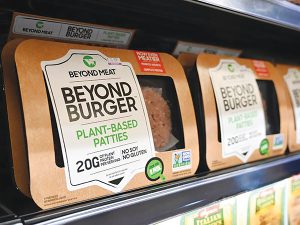The world’s largest beef producer joined a chorus of Cassandras this week signaling the end of alternative meats. Meat giant JBS SA killed its Planterra business in the US and shut down a 190,000 square-foot Colorado facility producing plant-based products. Yet the closure was gravely shortsighted. It reflects a crisis of confidence at a time when investors should be strengthening, rather than curbing, their funding in this sector.
There’s no question that plant-based product sales in the US have been flagging. The category’s meteoric growth in 2020 flattened in 2021 and, since last September, a key portion of its retail sales has dropped more than 10%.
Its reputation has also been badly bruised by the stock performance of Beyond Meat Inc., which plunged almost 80% from its peak after a spectacular initial public offering in 2020. Still, it’s a mistake for investors to write off the value and potential of the sector as a whole, which will be a keystone among climate solutions going forward.
Sinking sales of alternative meats have been driven in part by fluctuating prices. The 2020 demand surge for plant-based products occurred alongside risings costs of animal meats due to supply chain disruptions in the early stage of the pandemic. Now conventional meat prices have declined, and inflation is hurting producers like Beyond Meat as they struggle to make their plant-based products more affordable.
For now, consumers are understandably reluctant to pay a premium for alternative products, but many analysts predict that, soon enough, prices will swing back in favor of animal-free proteins. Far more concerning are the consumer perception problems that are punishing the plant-based category. A study released last week by Deloitte Consulting LLP, in which 2,000 consumers were surveyed, found that consumers are increasingly skeptical of the environmental and human health benefits of plant-based meats as compared to conventional meats.
The waning trust is dangerously misguided. The environmental advantages of plant-based products are well-documented and profound. Recent analysis shows that the production of plant-based burgers generates up to 90% less greenhouse gas emissions than that of beef burgers.
 The Gulf Time Newspaper One of the finest business newspapers in the UAE brought to you by our professional writers and editors.
The Gulf Time Newspaper One of the finest business newspapers in the UAE brought to you by our professional writers and editors.
